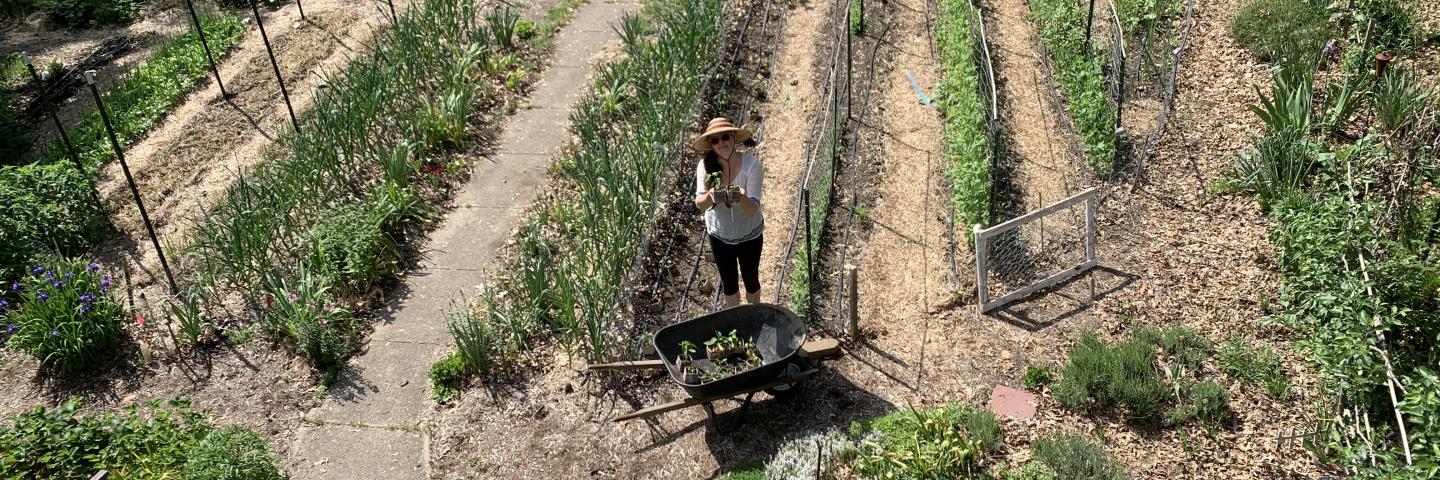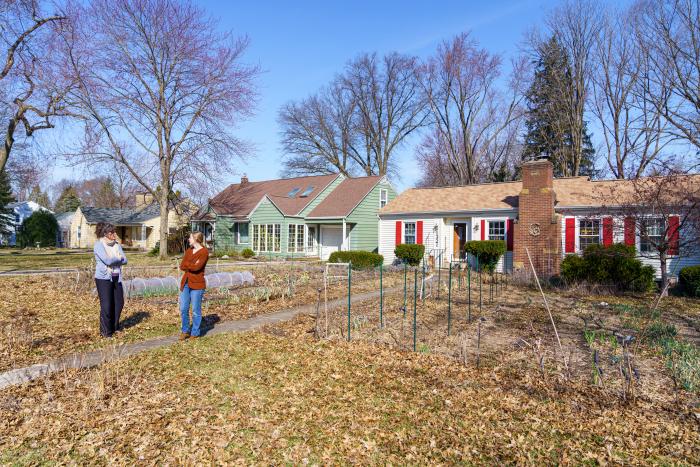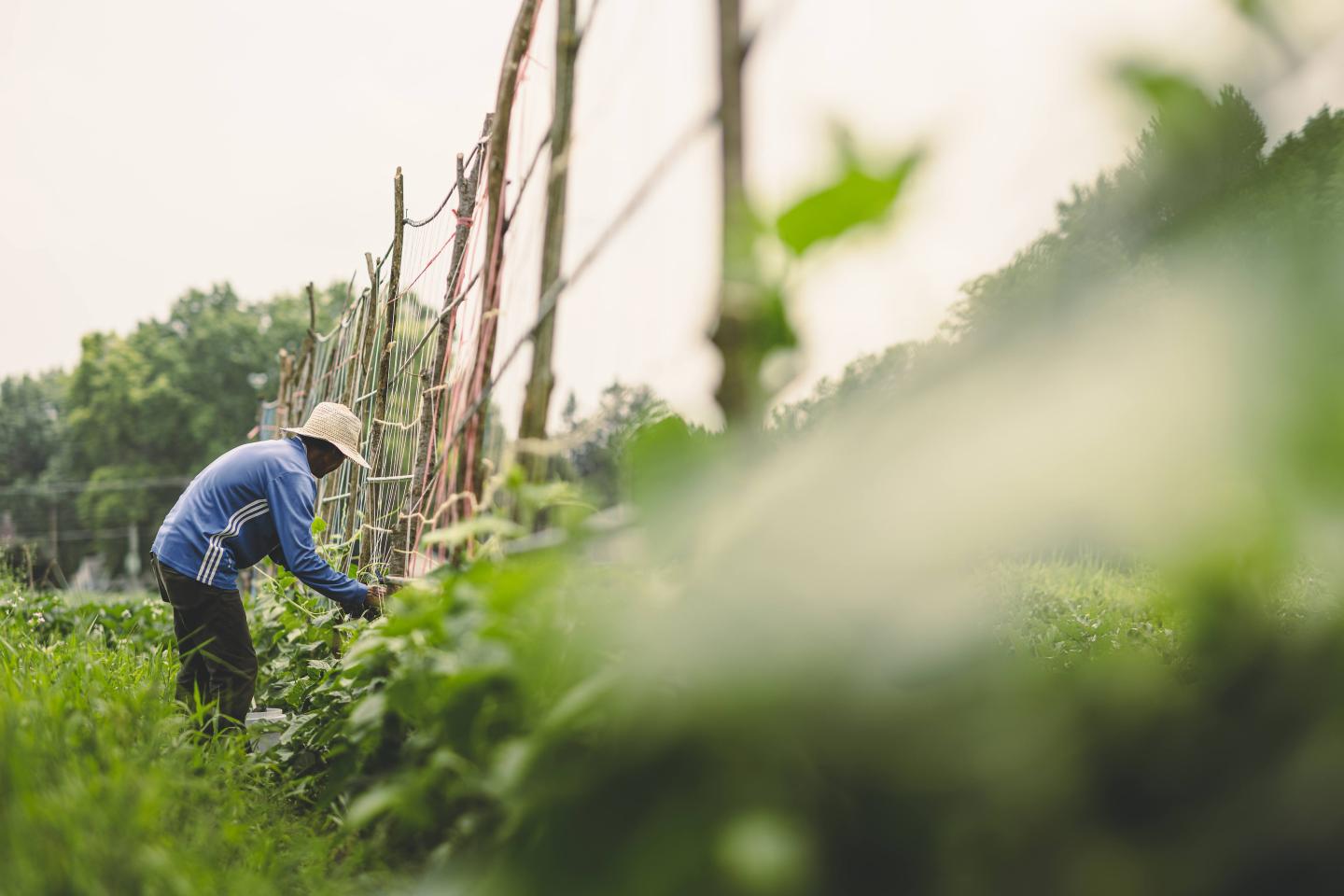Agreement benefits urban farmers, entire Indiana watershed

An agreement with Indiana NRCS enables Allen County SWCD to work directly with small and urban farmers who tend to have less familiarity with the assistance available to them as well as their operations’ impact on the water quality in Lake Erie.
Marissa Renz’s farm, Plant Happiness, pops up out of nowhere.
Driving down a residential road in Fort Wayne, Indiana, house after house with green lawns just starting to regain their color after a long winter suddenly give way to Renz’s front yard where during the summer rows of vegetables and greens have replaced the grass.
After purchasing the home in 2015, Renz committed herself to making a radical change to the landscape with an eye toward creating habitat for beneficial insects, introducing more native plants and growing food for her family.

It was a multi-year process to turn the roughly 4,000 square feet of grass in front of her house into a functioning farm, but the results have been abundant with Renz saying she harvested 1,000 pounds of produce during the 2021 growing season. The insects she hoped to attract have also arrived in spades with bees, wasps, spiders and other beneficial insects now a frequent sight.
She started small and the first year planted a few tomato plants around the edges of the yard. She introduced beds running from her house to the road in 2016 and by 2018 had transformed the entire yard into a micro farm that produces food for her family with enough left over to sell at local markets.
“I flipped all the sod over (on part of the yard) so I could kill the grass,” Renz said of the transformation. “Just turn it upside down, get rid of the grass, have the soil exposed and the roots exposed.”
The rest of the yard she transformed using sheet mulching made out of newspaper, cardboard and straw to break down the yard and create garden beds.
Farming in a residential area has come with challenges, though. The soil needed to be worked and nourished after years spent as a lawn. To find out what nutrients her plants needed, Renz did her own soil testing when she originally started the farm. She turned to the Allen County Soil and Water Conservation District (SWCD) as the farm grew for additional help understanding her soil and to supplement the lessons on urban farming she learned from Purdue Extension. Those tests showed her that nutrient levels such as the amount of phosphorous present had changed in the first three years of farming and enabled her to make the necessary adjustments to help her plants flourish.

Through a contribution agreement with USDA’s Natural Resources Conservation Service (NRCS), Allen County SWCD was able to provide free soil testing to small and urban farmers throughout the Western Lake Erie Basin, like Renz.
Allen County is unique within Indiana as its home to the second largest municipality in the state, Fort Wayne, and also more than 200,000 acres of cropland. The impact of those farms has left its mark on Lake Erie where runoff, excess nutrients and eroded soils may eventually end up. To help combat the harmful impact to Lake Erie and the other Great Lakes due to agriculture, NRCS offers assistance through the Great Lakes Restoration Initiative (GLRI) and Western Lake Erie Basin Initiative (WLEB), both of which provide targeted funds to farmers in watersheds surrounding the lakes to establish conservation practices into their operations.
In addition to the direct-to-producer funding made available through GLRI and WLEB, Indiana NRCS has provided funding to the Allen County SWCD through a contribution agreement. The agreement enables them to work directly with small and urban farmers who tend to have less familiarity with the assistance available to them as well as their operations’ impact on the water quality in Lake Erie.
“Urban agriculture has been expanding in Indiana for several years,” said Jerry Raynor, Indiana NRCS state conservationist. “NRCS recognized the growing need to increase technical assistance to these farmers, and we have turned to our partners to help us meet that demand. In addition to working with several SWCDs in urban areas of the state, we are also partnering with the Indiana Association of Soil and Water Conservation Districts and Purdue Extension to meet the needs of small and urban farms.”
Free soil testing has served as Allen County SWCD’s introduction to many of the small and urban farms in the Western Lake Erie Basin, Joelle Neff, a watershed coordinator with Allen County SWCD said, but through the contribution agreement they also have the ability to host trainings, offer technical assistance, set up demonstration plots and more. Renz’s is one of 23 farms that have benefited from the tests as of March 2022. Renz has also participated in, and led, educational seminars held by Allen County SWCD.
“I think it's getting our visibility out there in the community that we've perhaps not had before,” said Allen County SWCD District Director Greg Lake. “I think, unfortunately, a lot of people have no idea what a soil and water conservation district is, or who NRCS is or anything like that. So, having this opportunity to start working with more individuals in that small farm or urban setting creates an opportunity for our services to become more available and us to become better known to the community.”
Initial plans for in-person trainings had to be halted due to the COVID-19 pandemic, but over the last two years Allen County SWCD has held a series of “Coffee and …” webinars. The webinars enable small and urban farmers to learn from experts on a variety of topics including cover crops, composting and soil health practices. Renz said she has tried to attend the majority of the sessions to supplement her knowledge and she also served as the instructor for one on beneficial insects and best pest management practices along with Laura Ingwell, an assistant professor of horticulture and entomology at Purdue University.
Along with the “Coffee and …” webinars, Allen County SWCD has sponsored field trips for farmers to learn more about conservation, how to increase production and be better stewards of the land. One beneficiary were the farmers of Rose Avenue Education Farm who took a trip in June 2021 to Clay Bottom Farms, a micro farm in Goshen, Indiana.
Rose Avenue Farm started building the farm on an eight-acre plot in New Haven, Indiana in April 2020, just as the world was shutting down for COVID-19. A former corn and soybean field for as far back as records exist, the farm was subdivided into roughly half acre plots and contracted out to Burmese refuges who live in the area and were looking for a way to return to their agricultural roots.

The farmers each have a roughly half acre plot and they grow a variety of vegetables and greens frequently used in Burmese cooking, but hard to find in America. They then sell them to their fellow countrymen and women who have been relocated in the surrounding areas.
Jain Young, who manages Rose Avenue Farm through the non-profit Heartland Communities, has utilized Allen County SWCD’s urban farming resources since the first day the farm existed both though soil testing and education.
“The first time we were out in this field was April 2020,” Young said. “That day, it was April 20th I remember, and the Soil and Water Conservation District was out here with us taking soil samples. That was the very first thing we did.”
The initial tests were conducted under a prior agreement between Allen County SWCD and Indiana NRCS, but they have found additional ways to work together under the new agreement including the field trip to Clay Bottom and a second round of soil testing in April 2022 to track the impact of the field’s transition from corn and soybeans to vegetable beds.
After learning what was in their soil, the field that became Rose Avenue Education Farm was divided into plots assigned to each farmer, with some gravitating to areas where the soil reminded them of home. It was backbreaking work to transform the field as each farmer had to cut their own 30 inch wide by 70 feet long beds into the former row crop field with help from a push tractor. But the lessons learned from their visit to Clay Bottom have paid dividends as they developed Rose Avenue Farm, including ideas of how to build a vegetable washing station, instructions on mulching and tarping fields and how to correctly price products at market to allow themselves to flourish without undercutting other farmers.
“There are 800 or 900 of those (beds),” Young said. “The first guy that was brave enough to try it and did a couple of rows, and you kind of have to wrestle (the tractor) a little bit, it's not easy to do. You have to have a certain amount of strength. He got those first couple rows done and he stopped and threw his hands up and he said, 'Give me a water buffalo.’”
The hard work and educational resources paid off though, as Young proudly declares that the farmers combined to make more than $100,000 in profit from the field in 2021. They are also continuing to build upon the relationship with Allen County SWCD by constructing a demonstration plot where conservation farming techniques such as no-till and cover crops will be established to help teach the farmers about their benefits. Working with Allen County SWCD has also led Young and Rose Avenue Farm to apply for NRCS’s Environmental Quality Incentives Program (EQIP) with hopes of building a season high tunnel to lengthen the growing season, plant a pollinator habitat and remove invasive species from the surrounding forestland.
“I think it creates awareness that what you do on your land matters,” Neff said, of the impact the agreement between Allen County SWCD and Indiana NRCS has had. “A lot of people don't even know what a watershed is and what watershed they live in. So, I think that it starts the ball rolling of 'Oh, I didn't even know this was a thing. Now I know. So, what do I do about it?' It increases that education which then will eventually lead to action.”
For more information about soil testing or how Allen County SWCD can help on your small or urban farm in the Western Lake Erie Basin, call (260) 484-5848 or visiting their website at AllenSWCD.org.
Additional Information
Indiana Special Initiatives
NRCS uses Landscape Conservation Initiatives to accelerate the benefits of voluntary conservation programs, such as cleaner water and air, healthier soil and enhanced wildlife habitat.
Learn MoreEnvironmental Quality Incentives Program - Indiana
The Environmental Quality Incentives Program (EQIP) provides financial and technical assistance to agricultural producers and non-industrial forest managers to conserve natural resources while strengthening their operations.
Learn MoreINDIANA NRCS HOMEPAGE
For more information about NRCS programs offered in Indiana and how experts throughout the state can help you address natural resource concerns on your land, visit the Indiana NRCS homepage.

